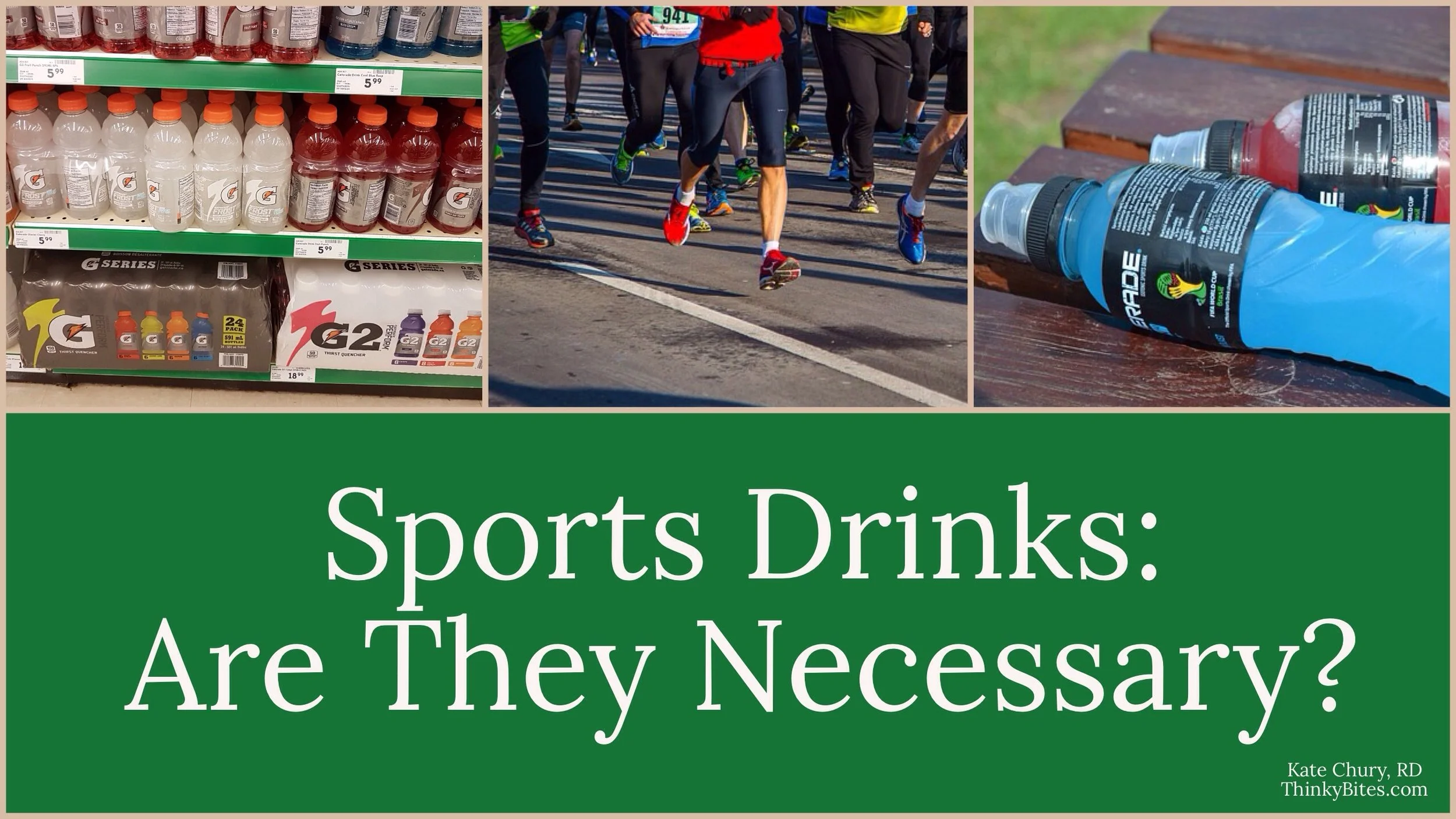Sports Drinks: Are They Necessary?
/Sports drinks. They have flashy commercials and are promoted by a wide range of professional athletes. They boast superior hydration and sport performance. Their marketing is really impressive and leads the general public to believe that they are a MUST HAVE if you are engaging in any sort of physical activity. BUT, are they really needed? Do those of us who are not elite athletes or those of us who are not training for hours on end really need to consume sports drinks to stay hydrated? The answer, according to many experts in the field, is no. Water, rather than sports drinks, should be the primary go-to for hydration.
WHAT ARE SPORTS DRINKS?
Sports drinks are beverages meant to rehydrate and replenish the fluid and electrolytes (sodium and potassium) lost during exercise, and more specifically intense exercise that makes you sweat a lot. Our perspiration is not only made of up water but also sodium and potassium (among other things), and it make sense that these elements are going to need to be replaced somehow. This is where sports drinks come in, at least theoretically.
Another significant component of sports drinks is their carbohydrate, or sugar, content. Sugar is added to these drinks to provide an energy source to fuel physical activity (our body runs on sugar) and to help replete muscle glycogen stores (glycogen is a stored form of sugar) after physical activity. And, of course, sugar is added to make it an appealing beverage because, well, people like sweet things.
In the world of competitive or high intensity sports, staying adequately hydrated means athletic performance won’t be hindered. This is why there is so much emphasis on hydration, repletion of energy stores and replacement of the electrolytes lost through intense physical activity.
WHEN MIGHT YOU NEED A SPORTS DRINK?
For the most part, the majority of recreational athletes probably just need to let their thirst guide their hydration needs and drink plain, old water. That being said, there may be some situations that benefit from some sort of electrolyte repletion including:
Engaging in intense exercise over an hour in duration
Exercise in hot or humid weather
Playing sports that require hot/heavy equipment such as hockey or football
Participating in day long activities, such as a sports tournament
Those who experience exercise-associated muscle cramps (EAMC)
Those who sweat a lot during exercise (especially sweat that leaves salty residue when it dries)
So, there may indeed be some situations in which sports drinks could be useful for some of us not-so-elite athletes. However, the answer to repleting fluids and electrolytes lost during exercise may still be in choosing food and water over sports drinks. Sports dietitian, Celine Evans, MSc, RD of Nutrition 360 agrees. She often encourages those who sweat heavily to consider having a post-exercise recovery snack that contains some amount of sodium, whether that's naturally in the food or added, such as flavoured milk, pretzels or half salted nuts (salted nuts mixed with unsalted nuts). Sodium is quite abundant in our food supply and not that difficult to obtain. Potassium, as well, is easy to come by and found in many fruits and vegetables.
THE DOWNSIDE OF SPORTS DRINKS
One of the biggest problems with sports drinks is their sugar content. I am by no means in the "sugar-is-toxic" camp. Sugar is not toxic nor is it a poison. However, in general the typical western diet contains too much of it and we should take care to limit our intake. If you are drinking sports drinks unnecessarily, you are likely ingesting sugar that you body probably doesn't need.
Let’s take a closer look at the sugar content of one of the market’s best selling sports drinks, Gatorade. Gatorade contains anywhere from 31-41 grams of sugar per bottle, which is about 7-10 teaspoons (tsp) of sugar. Putting this into perspective, the World Health Organization recommends limiting sugar to less than 12 teaspoons per day (and ideally less than 6 tsps per day). This means that one bottle of Gatorade can contain 60-80% of that maximum daily sugar limit. For athletes who are training quite intensely, this isn’t a problem. They have high caloric and carbohydrate (i.e. sugar) needs. For recreational athletes, this carbohydrate need is not as high.
Another critique of sports drinks is that they are detrimental to dental health, specifically playing a role in erosion of the dental enamel. It should be said that sports drinks aren’t the only beverages that damage dental enamel, as wine, juice and carbonated beverages are all known to do this, as well. It all comes down to the acidity of the beverages, and a lot of beverages, including sports drinks, are slightly acidic. The evidence is mixed regarding the effects of sports drinks on teeth but they do have the potential to be damaging to dental enamel, depending on quantity and frequency consumed. We know that kids who drink more acidic drinks (like juice), and less milk and water have a greater risk of dental erosion. This is just one more reason to limit the consumption of sports drinks to those who really need them.
OVERHYDRATION
With all this talk of dehydration, it’s important to also address overhydration. Overhydration causes a drop in your blood sodium level, or hyponatremia. Exercise associated hyponatremia is a serious, and potentially life-threatening, condition.
Symptoms of hyponatremia include:
Nausea and vomiting
Headache
Confusion
Fatigue
Muscle weakness, spasms, or cramps
Seizures
Coma
Interestingly, there have been several studies that show electrolyte-rich sports drinks do not prevent against hyponatremia. It was found that the sheer volume of fluid, independent of whether or not it contains electrolytes like sodium, was a factor in the development of hyponatremia. In simpler terms, it was the amount of fluid consumed that caused the dangerous drop in blood sodium. The presence of sodium in sports drinks did not prevent low sodium levels. This means that sports drinks aren’t doing what they are meant to do, at least in some individuals.
Contrary to what the marketers of sport drinks want you to believe, you don’t need to “stay ahead of your thirst” to be adequately hydrated. This is the type of advice that leads to dangerously low blood sodium levels. Physiologically, our body does not manage our hydration levels instantly. Rather, we are what is called “delayed drinkers”, and will correct fluid and electrolyte imbalances incrementally (i.e. at the next meal or snack). Again, it really is best to trust our thirst when it comes to hydrating the body. Gulping down sports drinks to stay ahead of dehydration isn't the answer.
FINAL VERDICT?
If you are not a high performance athlete or one who trains intensely, chances are don’t need a sports drink. Water should be your drink of choice, whether that is before, during or after your exercise. Electrolytes, such as sodium and potassium, as well as carbohydrates can be obtained through diet, rather than a specially formulated sports drink. Having a snack or meal shortly after exercise will likely be enough to replete any electrolyte and carbohydrates lost during exercise. Sports drinks aren't the answer for most people.
If you are starting to ramp up your physical activity or beginning an intense training program, chat with a Registered Dietitian (RD) about your nutrition and hydration needs.
For more tips on hydration, including weighing yourself pre- and post workout to determine fluid needs check this resource out.
For ideas on recovery meals and snacks, check out this resource Refueling To Recover After Exercise.






